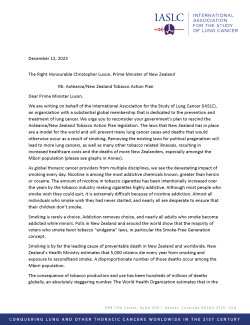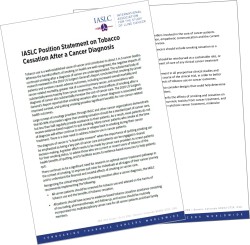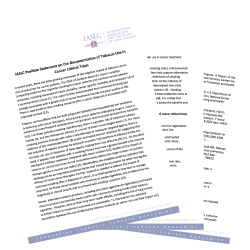Barcelona—The International Association for the Study of Lung Cancer today used the platform of its largest international meeting to call attention to the importance of tobacco cessation after cancer diagnosis, and urged all physicians to screen cancer patients for tobacco use and recommend tobacco cessation.
Cancer patients who continue smoking after their diagnosis have a higher mortality rate and a higher risk for a second cancer development. The clinical effects of smoking after the diagnosis of cancer also has a substantial effect on increased cancer treatment costs, according to the Declaration.
The IASLC Tobacco Control and Smoking Cessation Committee has undertaken this initiative to raise physician involvement in tobacco control, said Dr. Jacek Jassem of the Medical University of Gdansk in Gdansk, Poland.
“For too long this has been a neglected problem in the education of health professionals. Many physicians still believe that it is too late to offer smoking cessation support at cancer diagnosis. Likewise, most patients believe that there is nothing to be gained from quitting once being diagnosed,” Jassem said.
- All cancer patients should be screened for tobacco use and advised on the benefits of tobacco cessation.
- In patients who continue smoking after diagnosis of cancer, evidence-based tobacco cessation assistance should be routinely and integrally incorporated into multidisciplinary cancer care for the patients and their family members.
- Educational programs regarding cancer management should include tobacco cessation training, empathetic communication around history of tobacco use and cessation and utilization of existing evidence-based tobacco cessation resources.
- Smoking cessation counseling and treatment should be a reimbursable service.
- Smoking status, both initially and during the study, should be a required data element for all prospective clinical studies.
- Clinical trials of patients with cancer should consider designs that could also determine the most effective tobacco cessation interventions.
Read the entire IASLC Tobacco Declaration here: https://www.iaslc.org/tobaccodeclaration.
The IASLC Committee partnered with the U.S. Food and Drug Administration, the National Cancer Institute, the American Association for Cancer Research and the American Society for Clinical Oncology in September for a small internal meeting discussing the importance of capturing tobacco use status of patients participating in clinical trials. Currently, there are very few prospective clinical trials addressing smoking cessation after cancer diagnosis.
“This issue can be overcome by raising awareness among the health care community about the importance of smoking cessation after cancer diagnosis,“ said Dr. Emily Stone, Kinghorn Cancer Centre, St Vincent’s Hospital Sydney. “Hopefully, our initiative will contribute to changing this attitude.”
###
About the WCLC:
The WCLC is the world’s largest meeting dedicated to lung cancer and other thoracic malignancies, attracting more than 7,000 researchers, physicians and specialists from more than 100 countries. The goal is to increase awareness, collaboration and understanding of lung cancer, and to help participants implement the latest developments across the globe. The conference will cover a wide range of disciplines and unveil several research studies and clinical trial results. For more information, visit wclc2019.iaslc.org.
About the IASLC:
The International Association for the Study of Lung Cancer (IASLC) is the only global organization dedicated solely to the study of lung cancer and other thoracic malignancies. Founded in 1974, the association's membership includes more than 7,500 lung cancer specialists across all disciplines in over 100 countries, forming a global network working together to conquer lung and thoracic cancers worldwide. The association also publishes the Journal of Thoracic Oncology, the primary educational and informational publication for topics relevant to the prevention, detection, diagnosis and treatment of all thoracic malignancies. Visit www.iaslc.org for more information.




